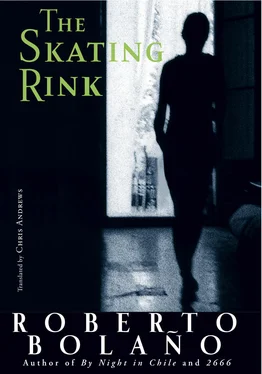Enric Rosquelles:
Unfortunately, after dinner, Pilar insisted that we go to a disco
Unfortunately, after dinner, Pilar insisted that we go to a disco; she suddenly felt like dancing with her husband, something they hadn’t done for a long time, and everyone thought it was a wonderful idea. Except me. I should have grabbed Nuria and made my getaway right then, but I thought she deserved a bit of fun. My big mistake, of course, was not foreseeing that someone would bring up the subject of skating. Nuria’s presence, as I soon realized, made it inevitable, and the dreaded moment came while we were watching people make fools of themselves on the dance floor, before we had dared to do likewise. The councilor in charge of culture, or his wife, one of them, opened fire by asking if there was a competition coming up. Nuria’s reply was utterly naïve: yes. Initially there was some talk about her representing Z: she had to fly the flag and fly it high. Then, for want of a better topic, I guess, the difficulties and delicacy of skating were discussed (like an iron butterfly, shouted out the councilor responsible for tourism, visibly pleased with his simile) and Nuria had no choice but to agree and assure them, with all her candid enthusiasm (poor Nuria), that she was training for at least five hours a day. In Barcelona? asked Enric Gibert. No, in Z, said Nuria, as emphatically as a tombstone being dropped into place on a grave. My grave. Luckily I have quick reflexes: right away I asked her to dance. As we walked away toward the dance floor, I looked back and saw Pilar staring at me. The rest of them were laughing and talking, but Pilar, who might be careless and negligent at times, but is certainly nobody’s fool, kept her dark gimlet eyes fixed on me. I would gladly have kept on walking and never returned to that table. I was sweating, but not from the exertion. Dancing has never been my forte, but I threw myself into that alien world, perhaps to delay the impending catastrophe, albeit momentarily, perhaps to enjoy being close to Nuria for the last time. And to be honest, I wasn’t too bad. All my usual fears vanished in the commotion of the dance floor, and I believe I can explain why: to dance well you have to forget your own body. It must cease to exist. In spite of all its extra pounds and its divergence from current esthetic norms, my body swayed and bounced, lifted one leg, then the other, then a leg and an arm, then leaped in the air and spun around, all without any help from my mind, which had, meanwhile, withdrawn to somewhere behind my eyeballs, where it was assessing the situation, weighing up the pros and cons, attempting to read Pilar’s thoughts telepathically (with a certain trepidation, I admit), guessing at the scope of the questions she would ask and trying to fabricate convincing replies. When we came back to the table, we were literally dripping with perspiration. The wives of both councilors felt obliged to make humorous remarks about my little-known passion for dancing, which they summed up by saying, You’ve been keeping that quiet! I accepted their praise and their jokes good humouredly, since they were giving me a few seconds’ grace. Pilar, by contrast, was not at all talkative; her husband had just gone to the bathroom. Inspired by my example, the councilors and their wives got up to dance, leaving only myself, Pilar and Nuria at the table, which was plunged in an ominous darkness. I remember there was a slow tune playing — was it a bolero? — and all the dancers who a moment before had been jumping around among the lights let their shoulders droop, went suddenly languid and collapsed into each other’s arms. Wretched as I was, I thanked heaven that we were no longer dancing, since I was mortified by the thought of Nuria resting her head against my shoulder or my chest (as all the girls were doing, even the councilors’ wives) and smelling the reek of my sweat. That’s the way I am; I always try to make a good impression. No doubt people are saying now that on such-and-such an occasion my socks or my breath stank. Lies. In matters of personal hygiene I have always been scrupulous to a fault, since I was a teenager. But as I was saying: there we were, the three of us, watching the dancers, avoiding each other’s eyes, and the mayor’s husband still hadn’t come back. I could exaggerate and say that I was listening to Pilar’s breathing, quick and uneven like my own, but it wouldn’t be true, the music was too loud, as it always is in discos. When I brought myself to look at Pilar, her face frightened me: it was as if her flesh, her features, were being absorbed by her skull, sucked into a kind of facial black hole, leaving only a trace of determination in her gaze and furrowed brow. At any rate, I realized I was in for trouble. I would swear on anything you like that Nuria had no idea what was going on. Her countenance, her beautiful perfect face, was flushed, but only because she’d just finished a string of dances, that was all. Then the tall and noble figure of Enric Gibert reemerged from the shadows. Ask her to dance, said Pilar in a peremptory tone, clearly a ploy to get them out of the way. Nuria accepted without hesitation, and I watched them from my seat, as she led the way to the dance floor, and entwined arms with the overly adroit Enric. I could feel a burning lump in my stomach. It wasn’t the moment to be feeling jealous, but I was. My imagination spun out of control: I saw Nuria and the mayor’s husband naked, caressing each other; I saw everybody making love, as if there had been a nuclear attack, and no one could leave the disco, and there was nothing left to restrain their passions and basic instincts; they had all become rutting animals, except for Pilar and myself, the only ones remaining cool and calm in the midst of the orgy. When I realized that Pilar was talking to me, I gave a start. I snapped out of my reverie. Where is the skating rink? she asked. I made a futile attempt to change the subject; I even mentioned her future career as a member of parliament and the way it would change her life, but it was no use; Pilar continued to inquire into the location of the skating rink, as if it made any difference. What does it matter, I said, she has to train somewhere, doesn’t she? At that point Pilar spat out a pair of heavy-duty curses, and for a second I felt her lips, burning hot under the layer of lipstick, against my ear: Where is it, for fuck’s sake? In the Palacio Benvingut, I thought you knew, I said. Under the table, Pilar’s high heel stabbed into my groin. I must have winced because Pilar shouted a new volley of profanities into my ear. Take it easy, I whispered. Luckily the others came back at that point. They all realized; Pilar’s face made it patently clear that something had spoiled her evening, but no one wanted to deal with it; on the contrary, they seemed even more bubbly than before, especially the mayor’s husband, who kept joking with Nuria, while the councilors and their wives were well on their way to a grade-A bender. Just remembering those minutes makes me feel sweaty and crushed. Of course I tried to hold my head up and follow one of the conversations going on at the table (Enric, Nuria and the cultural councilor’s wife were on one side, with the other wife and the two councilors opposite) but I couldn’t understand a thing: it was a chaos of laughter, half-empty mixed-up glasses, and grunts and squawks unfit for human ears. Pilar, who had, apparently, been talking with the two councilors, suddenly stood up, as firm and strong as a tree, and ordered me onto the dance floor with a gesture, although I suppose she said something too. Luckily for me, they were still playing slow numbers. I say luckily because, in the first place, I was genuinely tired, and secondly because, whatever music played, Pilar was going to keep a firm hold on me so we could talk. To tell the truth, even at that moment, my admiration and affection for her remained intact. Her force of character, her obstinacy, her capacity to stand firm — those fundamental virtues of the Pilar that she was and is — could only inspire profound respect. Nevertheless, in spite of that esteem (which, I am sure, was mutual), it was the most hideous dance of my life. Wearing a skewed smile I had never seen on her face before, Pilar led me wherever she liked, and although I occasionally stumbled and seized up, in the end she had her way with me. I don’t know if Nuria saw us or not, I was never brave enough to ask her; I must have been such a pitiful sight! Specifically, Pilar’s interrogation focused on a single point: who else knew about the existence of the skating rink. Not when it had been built, or why, or where the money had come from, but who else was privy to the secret of its existence. I assured her that the people who had worked on the rink (who were, in fact, very few in number) had no real sense of my overall scheme. Then I told her that I was planning to present the project in detail at the council meeting in September or October, once the summer season was over. The rink could be opened to the public in December, in time for Christmas, half price for children and a big do for the inauguration. In short, I presented a wide range of uses and justifications for the facility, but nothing would calm her down. Much later, when we were all saying good night, Pilar came over to give me a kiss on the cheek, like Judas I thought, and whispered: You could ruin me, you son of a bitch. All the same, she seemed a little calmer. .
Читать дальше












